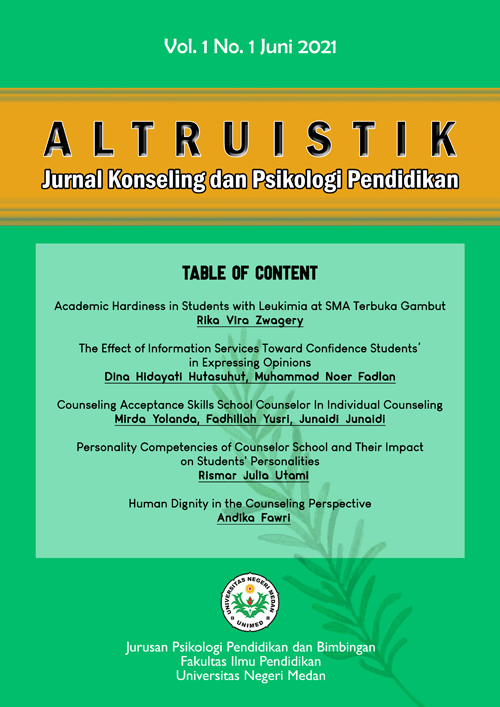The Effect of Information Services Toward Confidence Students™ in Expressing Opinions
DOI:
https://doi.org/10.24114/altruistik.v1i1.24854Keywords:
Information Services, Confidence Expressing Opinions, Students, OnlineAbstract
This research aims to determine the effect of information services on confidence in expressing opinions in student online lectures. The method used in this study is a quantitative method. This type of research is a quasi-experimental with the type of Pre test-post test one group design. The subjects in this study were 30 students in semesters 1 and 3 who had low confidence in expressing their opinions. The instrument used is a self-confidence scale in expressing opinions. Instruments are given before and after the implementation of information services. Data were analyzed using the Wilcoxon test. Pre-test data in the experimental group obtained an average = 73.5 while the post-test data obtained an average = 119.30. This data is in accordance with the Wilcoxon level test obtained Jcount = 132 while Jtable = 105. Based on the critical value table J for the Wilcoxon marked level test for n = 30, = 0.05 the hypothesis is accepted. That is, there is a significant effect of providing information services on confidence in expressing opinions on online student recovery.References
Aristiani, R. (2016). Meningkatkan Percaya Diri Siswa Melalui Layanan Informasi Berbantuan Audiovisual. Jurnal Konseling Gusjigang, 2(2), 182“189. https://doi.org/10.24176/jkg.v2i2.717
Ihsanuddin. (2020). Jokowi Umumkan Dua Orang di Indonesia Positif Corona. Kompas.Com.
Mahdalena, M. (2019). Layanan Informasi Meningkatkan Percaya Diri Siswa Dalam Mengemukakan Pendapat di MAN 3 Banjarmasin. Jurnal Mahasiswa BK An-Nur : Berbeda, Bermakna, Mulia, 5(2), 1. https://doi.org/10.31602/jmbkan.v5i2.2077
Prasetyaningtyas, S. (2021). Pelaksanaan Belajar dari Rumah (BDR) Secara Online Selama Darurat Covid-19 di SMP N 1 Semin. Jurnal Karya Ilmiah Guru, 5(1), 86“94.
Thantaway. (2005). Kamus Istilah Bimbingan dan Konseling. Kanisius.
Downloads
Published
Issue
Section
License
Copyright (c) 2021 Dina Hidayati Hutasuhut, Muhammad Noer Fadlan

This work is licensed under a Creative Commons Attribution-ShareAlike 4.0 International License.
Authors published in this journal agree to the following terms:
- The copyright of each article is retained by the author (s).
- The author grants the journal the first publication rights with the work simultaneously licensed under the Creative Commons Attribution License, allowing others to share the work with an acknowledgment of authorship and the initial publication in this journal.
- Authors may enter into separate additional contractual agreements for the non-exclusive distribution of published journal versions of the work (for example, posting them to institutional repositories or publishing them in a book), with acknowledgment of their initial publication in this journal.
- Authors are permitted and encouraged to post their work online (For example in the Institutional Repository or on their website) before and during the submission process, as this can lead to productive exchanges, as well as earlier and larger citations of published work.
- Articles and all related material published are distributed under a Creative Commons Attribution-ShareAlike 4.0 International License.
All writing in this journal is the sole responsibility of the author. Altruistik provides open access to anyone so that the information and findings in these articles are useful for everyone. Altruistik can be accessed and downloaded for free, free of charge, following the creative commons license.
License
ALTRUISTIK : Jurnal Konseling dan Psikologi Pendidikan is licensed under a Creative Commons Attribution-ShareAlike 4.0 International License.
You are free to :
Share — copy and redistribute the material in any medium or format
Adapt — remix, transform, and build upon the material for any purpose, even commercially
Under the following terms :
Attribution — You must give appropriate credit, provide a link to the license, and indicate if changes were made. You may do so in any reasonable manner, but not in any way that suggests the licensor endorses you or your use.
ShareAlike — If you remix, transform, or build upon the material, you must distribute your contributions under the same license as the original
No additional restrictions — You may not apply legal terms or technological measures that legally restrict others from doing anything the license permits


